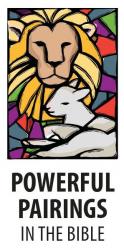
Chapters 11 and 12 of the Second Book of Samuel recount a dark and disappointing episode in the life of Israel’s ideal king. King David’s military conquests assure a level of stability for Israel. He is associated with many of Israel’s psalms and brought the ark of the covenant to the capital city of Jerusalem. His behavior, however, is not always ideal.
Apparently, in the season when most kings are at war in the Ancient Middle East, David stays home while his troops do battle with the Ammonites. When he catches sight of a woman bathing, he has to have her, resulting in a pregnancy. David then plots to have her warrior husband come home from battle and sleep with her, hoping to hide the child’s true paternity. When the warrior refuses to take pleasure while his comrades are in battle, David assures that when he returns to battle, Uriah will be killed, after which the woman is taken as the king’s wife.
It is a story of lust, evil conniving and murder, a story of betrayal and violent abuse of power. Throughout the telling of the story, the woman, later identified as Bathsheba, is never called by name but only referred to as the “wife of Uriah.” Throughout, David sees her as an object he can possess because of his station in life. Her husband, Uriah, is also objectified; his death merely paves the way for David to cover his sin.
In this shameful episode, David’s power is demonstrated by the use of such words as “send” and “take.” He could do as he pleased and expected others to follow his orders. But David’s power is shown to be fleeting when God does the sending, dispatching Nathan to reveal a truth David does not wish to hear.
Most royal courts in ancient times included priests and prophets, men whose presence usually endorsed the actions of their king, lending an air of respectability. Perhaps Nathan was such a court prophet. One thing is certain: after his divinely ordered encounter with David, the role of prophets in Israel would forever change. They would become known as speakers of truth, usually truths that monarchs and other institutional leaders did not want to hear.
In the case of David, Nathan uses a parable of selfish greed to convict the king of having done evil in the sight of the Lord. He sets a trap that invites the king to feel outraged on behalf of a poor farmer whose one precious lamb was stolen from him by a wealthy landowner. Nathan refuses to let David off the hook until the king realizes he has done the same in taking Bathsheba from Uriah and then taking Uriah’s life as well.
In the exchange between King David and Nathan, we see the emergence of the authentic prophetic movement in Israel. Prophets would no longer rubber-stamp the actions of the powerful. Instead, their role would be to speak with God’s authority, calling out behavior and attitudes that violate God’s covenant with Israel. By identifying the sin of God’s people and their leaders, prophets could open the way for a renewed commitment to mercy, justice and righteousness.
Catherine Upchurch is the general editor of the Little Rock Catholic Study Bible and contributes to several biblical publications. She writes from Fort Smith.
Please read our Comments Policy before posting.
Article comments powered by Disqus Studio 3:16 offers new approach to teaching religion
Studio 3:16 offers new approach to teaching religion
 After three decades, NLR principal plans to retire
After three decades, NLR principal plans to retire
 CHS athlete overcomes odds to reach collegiate goal
CHS athlete overcomes odds to reach collegiate goal
 John Calipari: UA basketball coach and devout Catholic
John Calipari: UA basketball coach and devout Catholic
 'Cabrini' film tells story of saint with great faith
'Cabrini' film tells story of saint with great faith
 St. Joseph a model of solidarity with immigrants
St. Joseph a model of solidarity with immigrants
 Two gifts after Jesus’ death: Virgin Mary and Eucharist
Two gifts after Jesus’ death: Virgin Mary and Eucharist
 Why we have an altar, and not just a communion table
Why we have an altar, and not just a communion table
 Pope: Wars should be resolved through nonviolence
Pope: Wars should be resolved through nonviolence
 Living relationship with Jesus Christ in the Eucharist
Living relationship with Jesus Christ in the Eucharist